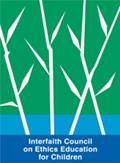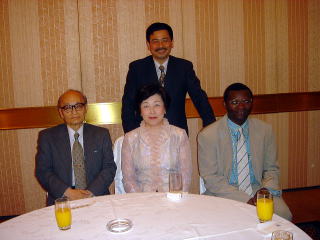
◆◆ Program ◆◆
13:00 Opening
Remarks by Arigatou Foundation Keishi Miyamoto
13:15 First Session
“Ethics Education in a World of Religious and Cultural Diversity”
Opening Remarks: Hans Kung President, Global Ethic Foundation
Panelists: Kul Gautam Deputy Executive Director, UNICEF
A.T. Ariyaratne Founder and President, Sarvodaya Shramadana
Movement
Nour Ammari GNRC Youth, Fisher Program
Moderator: Mukengeshayi Matata Director, Oriens Institute for Religious Research
14:40 Break
15:00 Second Session
“The Role of Religious People in Ethics Education”
Opening Remarks: Didi Talwalkar Swadhyaya Parivar
Panelists: Hasan Abu Nimah Director,
Royal Institute for Inter-Faith Studies,
Jordan
Mamiko Okada Professor, University of Hyogo
Moderator: Soho Machida Professor, Tokyo University of Foreign Studies
16:25 Announcement of Statement
16:30 Closing
Interfaith Council on Ethics Education for Children
Abbreviated Biography of the Panelists
First Session
Dr. Hans Kung
President, Global Ethic Foundation
Dr. Kung was born in Sursee, Switzerland in 1928. He is a scholar of philosophy and theology, and the author of many books and articles. Professor Kung studied at the Gregorian University in Rome, the Sorbonne, and the Institut Catholique de Paris. He drafted “The Declaration Toward a Global Ethic” adopted by the Parliament of the World’s Religions in 1993, as well as the Proposal of the InterAction Council for a Universal Declaration of Human Responsibilities in 1997.
Mr. Kul Gautam
Deputy Executive Director, UNICEF
Assistant Secretary General, United Nations
Born in Nepal in 1949, Mr. Gautam has had a long and distinguishing career with UNICEF since 1973. Mr. Gautam was the key senior UNICEF officer responsible for drafting the Declaration and Plan of Action of the 1990 World Summit for Children, and in 2002, the UN General Assembly Special Session on Children attended by 70 world leaders and thousands of child rights activists and civil society leaders, including celebrities and Nobel Prize Laureates.
Dr. A.T. Ariyaratne
Founder and President, Sarvodaya Shramadana Movement
Dr. Ariyaratne was born in Sri Lanka in 1931. He is founder of the Sarvodaya Shramadana Movement, which has made enormous contributions to rural Sri Lanka through community development. Dr. Ariyaratne is a recipient of the Magsaysay Award, which is widely known as the “Asian Nobel Prize,” for his community leadership in establishing and guiding the Sarvodaya Shramadana Movement. His work is done in pursuit of the ultimate ideal of “Sarvodaya” (universal awakening).
Miss Nour Ammari
GNRC Youth, Fisher Program
Miss Nour Ammari, born in Jordan in 1987, is a senior at Ahhliyyah School for Girls in Amman. She is a member of The Fisher Program, which provides youth with experiences in inter-faith dialogue, human and child rights advocacy, and peace-building and reconciliation. She is an active participation in GNRC activities at the local and regional levels. Miss Ammari is a member of her school choir and drama club, and her aim is to help show the world that compassion and kindness still exist in humanity.
Moderator
Fr. Mukengeshayi Matata, CICM
Director, Oriens Institute for Religious Research
Fr. Mukengeshayi Matata, CICM, was born in Congo in 1960. He studied philosophy and theology in Kinshasa and in Cameroon before arriving in Japan in 1989. After becoming proficient in Japanese, he entered Sophia University in 1991, and received a Masters Degree in Theology there in 1995. He was appointed Director of Oriens Institute for Religious Research in 1998 and is President of UCIP East Asia Federation. He writes often on Christianity and Japanese culture.
Second Session
Mrs. Dhanashree Shreenivas Talwalkar
Swadhyaya Parivar
Dhanashree Talwalkar, known as “Didi” (elder sister) to millions touched by the ideas of Swadhyaya (“study of the Self”), is the daughter of Revered Pandurangshastri Athavale, Swadhyaya’s founder. For nearly three decades, Didi has worked to create profound understanding of germinal ideas of Swadhyaya all over the world. She combines in her rare qualities of wisdom, love and activism to initiate, guide and motivate Swadhyayees towards selfless service to mankind.
Ambassador Hasan Abu Nimah
Director, Royal Institute for Inter-Faith Studies, Jordan
Ambassador Hasan Abu Nimah was born in Batir, Palestine, in 1935. Most recently Jordan's ambassador and permanent representative to the United Nations (1995-2000), Mr. Abu Nimah has served as ambassador to many European countries and to the European Community. He was a member of the Jordanian delegation to the peace talks between Jordan and Israel, which took place in Washington, DC. Mr. Abu Nimah is a prolific writer in English and Arabic, and lectures often at the Jordan Institute of Diplomacy.
Moderator
Dr. Soho Machida
Professor, Tokyo University of Foreign Studies
Dr. Machida was born in Japan in 1950. After 20 years as a Buddhist priest, he went to the U.S. and earned a Masters in Theology from Harvard Divinity School and a Doctorate in Asian Studies from the University of Pennsylvania. He was professor of East Asian Studies at Princeton University from 1990 to 1998, and taught at the National University of Singapore from 1998 to 2000, when he returned to Japan. He is an expert in comparative religion, comparative civilizations, and bioethics.
Dr. Mamiko Okada
Professor, University of Hyogo
Dr. Mamiko Okada was born in Kyoto, Japan, and graduated from Tokyo University. After earning a Dr.Phil. from Bonn University, Germany, she taught at International Buddhist University and Kobe Women’s University. Dr. Okada is a trustee of the Japanese Association for Religious Studies, and a member of numerous committees. She is the director of the non-profit Senhime Project, and is on the Ethics Committee at Western Kobe Medical Center. She is an expert in environmental and religious studies, philosophy, networking, and regional currencies.

Interfaith Council on Ethics Education for Children
The Interfaith Council promotes ethics education in cooperation with all
sharing this vision, seeking partnerships and developing alliances with
religious communities, United Nations agencies, NGOs, and a broad range
of others in the effort to realize the right of the child to full and healthy
physical, mental, spiritual, moral and social development and the right
of the child to education set out in the Convention on the Rights of the
Child.
|


